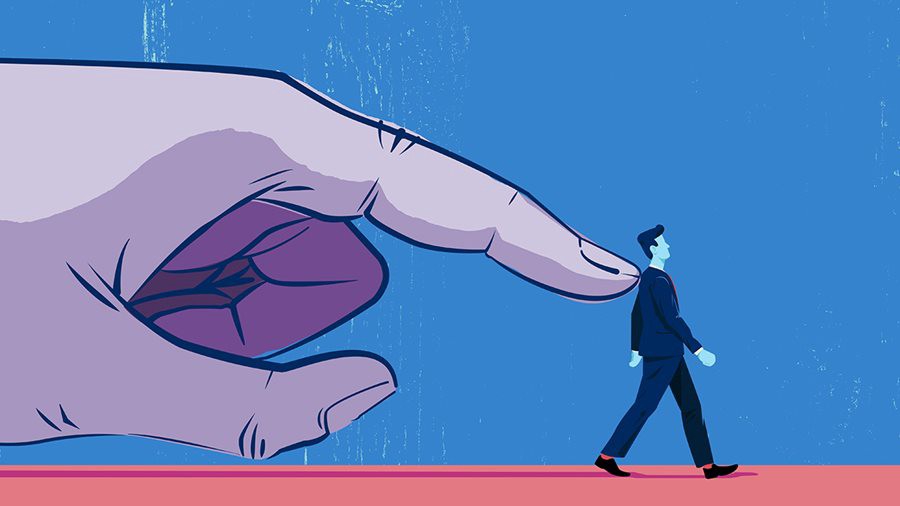The civic framework of freedom.
Death Trap

The debate over capital punishment illustrates two irreconcilable views of the nation.
Daniel Mahoney understands that the human rights regime, which has “proliferated since the 1960s” in the Western world, also “presides over the erosion of the nation.” Mahoney is right to draw understanding on this point from Pierre Manent. In his 2006 essay “La Raison des Nations” (Democracy without Nations?) Manent connects the ascent of the human rights regime to the demise of the national political form and the people that sustain it.
In the French regime under which Manent grew up, rights (and thus judges) were subordinated to the legitimate political authority. The rights regime (l’État de droit) was visualized as a pyramid capped by a constitution. In this arrangement, though rights are the moral end government pursues, the sovereign governing provided by the nation-state is the political means to achieving them. The nation-state “brings equality into being”; its constitution brings about “a decent common life.”
The sovereign supervises this common project. He is the guardian of the constitution. This is how Charles de Gaulle, as president of the Republic and head of state, regarded himself. It was he, not the Constitutional Court, who was the real guardian of the constitution. In their 1962 showdown with de Gaulle, provoked by his use of the referendum to change the constitution, the judges of the Constitutional Court yielded. They understood they were not sovereign.
This system was upended by the revolution of May 1968. For Manent, this revolution was an explosion of what Alexis de Tocqueville described as “democratic mildness.” Democracy—social equality—became the authority. The task of democracy was now to level every form of social hierarchy. Rights (and thus judges) became the instrument of democratic leveling.
In 1971, after de Gaulle’s death, the Constitutional Court read the Declaration of the Rights of Man and of Citizen into the Constitution’s preamble, to be defined and enforced by the court. Inspired by the May 1968 revolution, the Court became the guardian of the constitution—not the president, and certainly not the people who elected the president. The referendum was increasingly stigmatized as a far-right instrument. Now, motivated by democratic mildness, rights “actively and aggressively” target legitimate political authority, the nation-state and its people. The state, Manent exclaims, once the instrument to level inequality and resolve the social question, “is to be leveled in turn!”
While proponents of this new system boast about constructing a better, more inclusive community, they are simultaneously deconstructing the essential framework of duty and responsibility that communities require to remain in existence. Particularly under siege is the duty to defend one’s fellow community members. As Mahoney observes, “Democratic nations find it increasingly difficult to require citizens to serve in the armed forces to ask of them the ultimate sacrifice. That task is left to volunteers who are supposed to risk death as a professional hazard.”
Manent provides a provocative example of how one alteration in the meaning of rights is responsible for this particular difficulty. Motivated by democratic mildness, European courts and governments have changed the meaning of the right to life. It is no longer understood as a prohibition against intentional killing of innocents, qualified by the permissibility of individual and communal self-defense. Instead, it is interpreted as a prohibition against all intentional killing. Since 2002, every country within the Council of Europe has abolished the death penalty in all circumstances, including during war. This is celebrated as moral progress, but for Manent, the logic informing the abolition of capital punishment comes with a hidden cost. It demolishes the reason for the state’s existence.
A Game of Monopoly
Modernity’s architects, notably Thomas Hobbes and John Locke, imagine a state of nature in which, in the absence of any legitimate superior, each person is executor of the law of nature. Each person can, in cases of legitimate defense, carry out the death penalty. This situation produces something akin to a state of war. To escape this menace, each person confers the power to execute the law of nature on a third party, who becomes the legitimate superior: the sovereign state. The death penalty, reserved for the state, ratifies the state’s legitimate superiority. When Max Weber described the state having the monopoly on violence, he was adhering to the logic of modernity’s architects.
We entrust enforcement of individual and communal self-defense to the state to avoid constant interpersonal violence. This demands “an enormous sacrifice and an immense act of faith” in the state. Every criminal act that the state cannot stop casts doubt on this act of faith. “When a murder or a comparable crime is committed this sacrifice seems to have been made in vain and our confidence is betrayed . . . the state suffers a loss of legitimacy to the extent it shows that it lacks power.”
The persistence of violent crime at the hands of others demonstrates that we cannot completely leave the state of nature behind. The early moderns sought to accommodate this reality in two ways. First, because the dangers of the state of nature persist, the right to self-defense cannot disappear. Therefore, individuals have the right to possess arms for self-defense. This was not peculiar to the American context. In 1789, Honoré de Mirabeau proposed that the right to self-defense be enacted in the Declaration of the Rights of Man. The other delegates did not disagree with Mirabeau. However, concerned about prospects for arming potentially reactionary peasants and making grim preparations for France’s descent into the state of nature (namely, civil war), they kept postponing discussion of a definitive statement. They agreed only that arms for their own forces were indispensable. Had Mirabeau’s proposal passed, the language would have been even stronger than that of the U.S. Second Amendment:
All citizens have the right to keep weapons in their homes, and to use those weapons for the common defense or for their own self-defense, against any illegal aggression that endangers their lives, their families, or the freedom of one or several citizens.
The second remedy to unsanctioned violence is that the state—as Joseph de Maistre understood—must make a vivid demonstration of its monopoly on violence in the form of capital punishment for capital offenders. Through these displays, the state expresses both its regret that it could not stop the violent crime, and its reassurance that it can still be trusted to execute the law of nature.
A state that abolishes the death penalty believes that the true demonstration of its legitimacy is to have left the law of nature behind, demonstrating that it no longer needs to enforce that law. But this move implies the state itself can no longer fulfill its primordial function. When a state rejects “the death penalty as a matter of principle and conscience,” Manent writes, “thereby protecting the murderer of the person it could not protect, it pretends to have left the state of nature behind definitively . . . by pretending this, the state severs itself from the original source of its legitimacy [my emphasis].” How can this state, which on principle holds that the worst criminal will never risk death by his actions, ask me to risk death myself to defend it? Why would I fight for this kind of country?
Indeed, a country’s abolition of capital punishment tends to correlate with the unwillingness of their citizens to fight for their country. Of the countries surveyed in 2015 where fewer than 40% of respondents answered that they were willing to fight, only one—Japan—still permits capital punishment. All of Western Europe, where capital punishment has long been abolished, falls into this category.
Should the state work toward the utopian goal of completely escaping from the state of nature? Or should the state reflect the impossibility of such a wish? For Manent, the logic of the former position is clear. It entails the abolition of the sovereign state. When the most vivid manner by which the state demonstrates its sovereignty—the death penalty—has been eradicated, other signs of state sovereignty vanish as well. Perhaps the nation-state once did good things like design welfare programs to reduce inequality. But we now have those programs, so the state itself is now obsolete; at best it is an option, like having an army. Europeans think and act as though the sovereign state has fulfilled its purpose so completely that they can now consign it to a thrift store, filed under “accessories.”
Americans, Manent argues, have generally chosen the former option. By preserving both the death penalty and the right to bear arms, they “retain the feeling that they are living in a condition which makes this ‘accessory’ necessary, even indispensable.” The typical conservative response is to warn how Americans are tempted by the same utopian option that mesmerized postwar Europe to abolish the death penalty and the right to bear arms. But this does not quite capture the reality of the American situation.
As the federal government evolves, its non-military agencies assert that the right for its own administrators to bear arms is indispensable. This logic is neither postwar European nor utopian. It is the logic of one who prepares for the descent into the state of nature. Like the French revolutionaries, administrative agencies such as the EPA and IRS contend that the threat from the “reactionary peasants” makes arms indispensable—at least for them. The feds plan to operate in a situation that returns to the state of nature, not a situation that has escaped from it.
If pushed, Manent, like C.S. Lewis, would probably prefer to ground individual and communal self-defense in natural law rather than in the early modern appeal to the state of nature. But he ably dissects how the modern project of human rights does not just sever itself from classical natural law. It severs itself from its own—or any—substantial philosophical foundations. Perhaps the revolution of May 1968 was even more thorough than that effected by modernity’s architects.
The American Mind presents a range of perspectives. Views are writers’ own and do not necessarily represent those of The Claremont Institute.
The American Mind is a publication of the Claremont Institute, a non-profit 501(c)(3) organization, dedicated to restoring the principles of the American Founding to their rightful, preeminent authority in our national life. Interested in supporting our work? Gifts to the Claremont Institute are tax-deductible.
True freedom means recognizing both human individuality and absolute truth.
Rights unfettered by natural law are also undefended by it.



